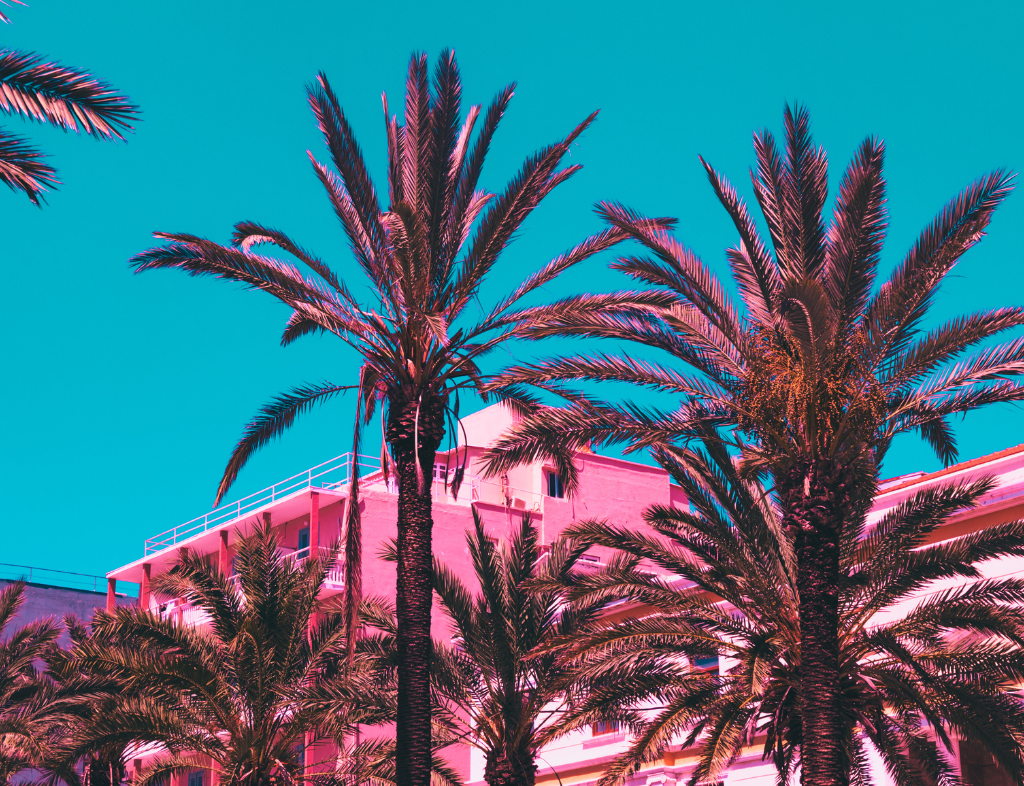Two Rivers, a White Path, and the Hotel California (Part 2)
pink hotel with palm trees in front
(Continued from Part One of Two Rivers, a White Path, and the Hotel California)
To return to the parable, the metaphorical, but just as dynamic voice of all life calls out to the traveler
“O traveler, with mind that is single, with right-mindedness, come at once! I will protect you. Have no fear of plunging to grief in the water or fire.” The traveler, having heard the exhortation on his side of the river and the call from the other, immediately acquires firm resolution in body and mind and decisively takes the path, advancing directly without entertaining any doubt or apprehension.”
We too receive that message in our daily lives that gives us glimpses of spiritual peace, which means we can live life a bit more boldly, a bit more authentically. When we awaken to the teaching that web of all life, that’s sometime visible but often invisible, supports us, we can perhaps go beyond our blind passions and, as Fremantle puts it, “even for a moment, the world does not disappear but is experienced in its true nature: pure, brilliant, sacred…”
The idea that we don’t divorce ourselves from this mundane world, but experience it with different lenses that actively seek to be freed from our blind passions, is referenced in one of the last lines of the song that goes:
“On a dark desert highway…hand to find the passage back to the place I was before.”
The traveler begins their journey on a dark desert highway and thinks they might find refuge in the Hotel California, just as we think we may find refuge in anything from drugs and alcohol to online shopping and trips to Vegas or obsessions over likes and followers on social media. But, after seeing the suffering at Hotel California, the traveler determines that they “had to find the passage back to the place I was before.” That highway is like the White Path of the traveler from the opening parable. And that path, or that highway, is open to all of us in that the light of wisdom, reality as it is, shines upon all of us without discrimination or calculation. That light gives us the possibility of pursuing the path of the mind aspiring for spiritual liberation.
As Shinran, the founder of Jodo Shinshu writes in A Collection of Passages Revealing The True Shinjin of the Pure Land Way:
“I realize that there is no discrimination between noble and humble or black-robed monks and white-clothed laity, no differentiation between man and woman, old and young. The amount of evil one has committed is not considered; the duration of any performance of religious practices is of no concern.”
This is vital because it helps us understand the last line of Hotel California not as an ominous warning, but a joyful realization:
“You can check out any time you like, but you can never leave.”
That sounds pretty dire, but in Jodo Shinshu, we learn that when we begin to understand that our lives are enmeshed with and supported by all life, great life, dynamic life we begin to gain glimpses of what spiritual peace or liberation, or enlightenment or whatever you want to call it may be like. We don’t immediately become an enlightened being or a Buddha, we don’t sail off on a lotus flower, because we still need to live our lives, but we do so with a greater appreciation for all that is around us. As Shinran notes in his Shoshinge, “We shall realize Nirvana without severing our blind passions.”
In essence, we can’t leave this world of blind passions until death, but we can check out of our moments of suffering. We can do this through humbly awakening to a reality greater than ourselves, greater than the beast and brigands on the eastern shore, or the beasts and brigands at the Hotel California. That reality is the world of enlightenment made possible, if I understand it correctly, through the Great Compassion that embraces all.
As you find yourself checking into the Hotel California at some point in your future, please remember that we are all that traveler on that dark desert highway and that white path.

